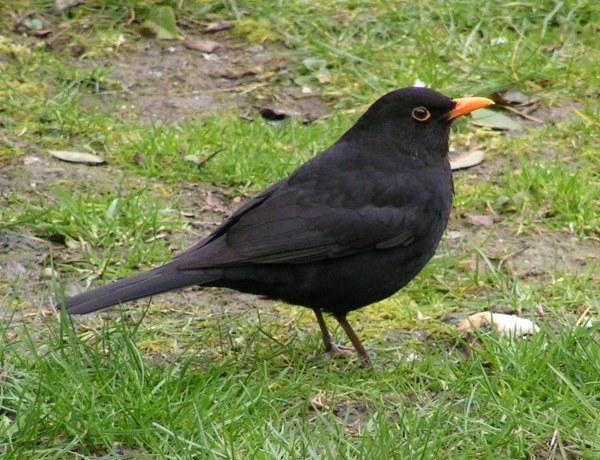|
| Query: White-collared blackbird | Result: 2nd of 2 | |
Common Blackbird (Turdus merula) - Wiki
| Subject: | Common Blackbird (Turdus merula) - Wiki
| |

| Resolution: 600x460
File Size: 63803 Bytes
Upload Date: 2007:01:28 22:37:00
|
Blackbird
From Wikipedia, the free encyclopedia
[Photo] Image of an adult male blackbird Turdus merula. Photograph originally taken by Sannse http://commons.wikimedia.org/wiki/User:Sannse and uploaded to en.wikipedia.org on April 17., 2004.
The Blackbird or Common Blackbird (Turdus merula) is a European member of the thrush family Turdidae.
It is common in woods and gardens over all of Europe and much of Asia south of the Arctic Circle. Populations are resident except for northern birds which move south in winter.
Blackbirds are 23.5 to 29 cm in length. They are omnivorous, eating a wide range of insects, earthworms, seeds and berries. They nest in bushes or similar, laying several (usually 4) bluish- green-grey eggs with brown reddish marks in a neat cup-shaped nest.
They do not form flocks, although several birds, especially migrants, may be loosely associated in a suitable habitat. Female blackbirds are especially fierce in the spring when they compete and fight with each other for a good nesting territory. Male birds are also competitive and will protect their territory by chasing away other males. If a fight between male Blackbirds does occur it is usually short and the intruder is soon chased away.
Adult males are all black except for a yellow eye-ring and bill. Adult female birds and juvenile birds have brown plumage and brown beaks and do not have a yellow eye-ring. Overall, juvenile birds are a slightly lighter brown than female birds and very young juvenile birds have somewhat speckled chests.
The male sings its varied and melodious song from trees, rooftops or other elevated perches.
The Blackbird has been introduced to many parts of the world outside its native range. In Australia and New Zealand it is considered a pest and has an effect on natural ecosystems.
The blackbird is the national bird of Sweden.
Because of a high mortality in the first year of life, a blackbird has an average life expectancy of 2.4 years; however, once past its first year a blackbird can expect to live longer and one blackbird has reached the age of 20 years.
Vocalisations
The Blackbird has a number of distinct calls:
- a persistent 'pink pink pink...'
- a mellow fluted song
- a clattering alarm call
Other blackbirds
Thrushes
Two related Asian Turdus thrushes, the White-collared Blackbird and the Grey-winged Blackbirds are also named as blackbirds.
Larger relatives of the Blackbird in the thrush family include the New World American Robin (Turdus migratorius), the Mountain Robin (Turdus plebejus), and several other species named as robins.
Icterids
Around 20 species of the New World icterid family Icteridae are named as blackbirds because of their superficial resemblance to the Old World thrushes, but they are not closely related. They include the Red-winged Blackbird (Agelaius phoeniceus), Red-breasted Blackbird ( Sturnella militaris), Yellow-headed Blackbird (Xanthocephalus xanthocephalus) and the Melodious Blackbird (Dives dives).
http://en.wikipedia.org/wiki/Blackbird
| The text in this page is based on the copyrighted Wikipedia article shown in above URL. It is used under the GNU Free Documentation License. You may redistribute it, verbatim or modified, providing that you comply with the terms of the GFDL. |
|
Comments |
|---|
| | Guest |
|
Scientific Name: Turdus merula Linnaeus, 1758
Common Names: Eurasian Blackbird, Common Blackbird, Blackbird, Black Thrush
French: Merle noir German: Amsel Spanish: Mirlo Común
Other common names: Chinese Blackbird (intermedius, sowerbyi and mandarinus), Eastern Blackbird (intermedius, sowerbyi and mandarinus)
Taxonomy: Turdus Merula Linnaeus, 1758, Europe = Sweden. |
 |

|

|
White-collared blackbird
2/2 |
 |
 |
^o^
Animal Pictures Archive for smart phones
^o^
|
|
|